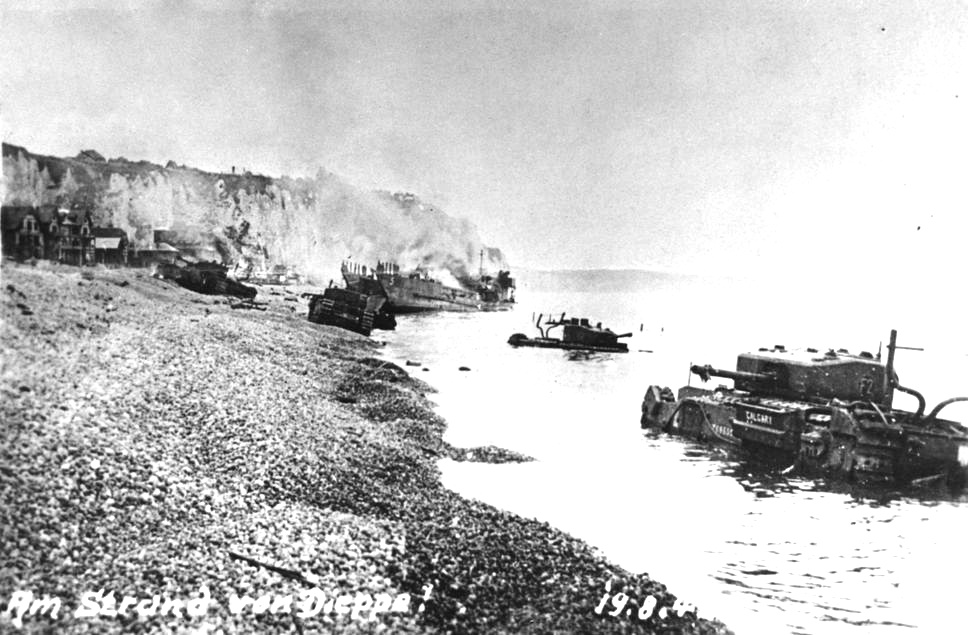A scout of our party who went out the road to recce was shot. The Germans had LMGs sited at each road and track intersection in this vicinity, with fields of fire in all directions. Shortly after 1000 (or it may have been near 1100) while in the wood, we heard the survivors of the beach being marched past under guard.
Before noon it was apparent that from all the sounds firing that we could hear both from Red and White beaches, as well as Blue beach where there was none, there was a little or no land fighting, and that the operation had resolved into an air battle. As far as we could see and hear from the wood, the German gunners had an unlimited supply of 88-MM, 20-MM, and LMG ammunition for AAA use, because they fired persistently and determinedly at every Royal Air Force machine they could see, without ceasing right up until 1600. The 88-MM battery of 6 guns on the clifftop between Notre Dame de Bon Secours and Puits served its guns magnificently. It was a low-level bombed at least four times and machine-gunned oftener by our fighters after 1000, that is, between 1000 and 1600, with us as witnesses, and each time the guns were back in action within a matter of few seconds, firing upon the departing aircraft. Once after a low-level attack, only two guns were instantly back in action, the other times always at least four.
Twice we made a recce to the cliff edge to see what might be taking place on the main beach at Dieppe, but we could see neither the beach which was just barely out of sight around the bend of the cliff nor any sign of ships. The situation suggested that we were trapped. After long consideration, the decision was taken to surrender and we surrendered in 1620. It may be permitted to mention the conduct of the troops in general on the beach. I can speak with the authority of Charlie and Dog Cos which I saw myself. From reports later heard from Officers of the Battalion at Verneuil, the other companies conducted themselves with no less credit.
In spite of the steady approach to the beach under fire, the Royals in my LCA appeared cool and steady. It was their first experience under fire, and although I watched them closely, they gave no sign of alarm, although first light was broadening into dawn, and the interior of the LCA was illuminated by the many flares from the beach and the flash of the Boston’s bombs. The quiet steady voice of Capt Thompson, seated just behind me, hold the troops up to a confident and offensive spirit, although shells were whizzing over the craft, and could hear the steady whisper and crackle of Navy Artillery fire over the top of the LCA. At the instant of touchdown, small arms fire was striking the LCA, and here there was a not unnatural split-second hesitation in the bow in leaping out onto the beach. But only a split second. The troops got onto the beach as fast as any of the summer exercises and got across the beach to the wall and under the cliff.
By the time we touched down, the smoke laid by the RAF had almost completely disappeared, traces only remaining in the tree-tops above the beach. The beach was thus plainly visible to the Germans, whose own fire positions were extraordinary well concealed from our view. The Royals were shot down in heaps on the beach without knowing where the fire was coming from. Their not unnatural bewilderment in this respect may have been contributory to the fact that in five minutes’ time they were changed from an assaulting Battalion on the offensive to something less than companies on the defensive being hammered by fire that they could not locate. The narrow confines of the beach did not permit moving away from the fire to engage it from another position.
Notwithstanding this, the troops followed their leaders smartly where they could, and when there was no place to move to, as in most cases, they lay still among the mortar bombs and watched their platoon and section commanders for what might be next. The only instance suggestive of panic that I saw or heard of on Blue Beach was when the Ambulance LCA was put back into shore at about 0600. A few men from the little spur where Charlie Co had been landed, were taking LMG fire from both flanks right into the thick of them. They could not go forward, they could not go sideways. The arrival of the LCA bearing a large red A on its standard suggested a means of getting out of this murderous cross-fire. Probably 20 men ran for the LCA. They were all killed in the craft’s bow-gate, by LMG fire.

















